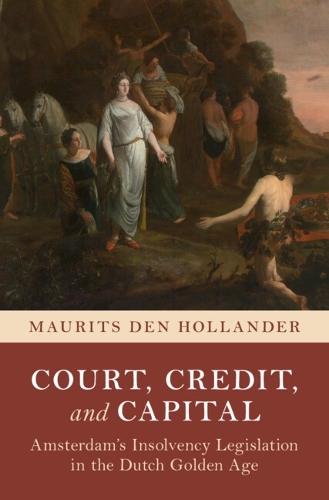Overview
Seventeenth-century Amsterdam was a city of innovations. Explosive economic growth, the expansion of overseas trade, and a high level of religious tolerance sparked great institutional, socioeconomic and legal changes, a period generally known as 'the Dutch Golden Age.' In this book, Maurits den Hollander discusses how insolvency legislation contributed to the rise of a modern commercial order in seventeenth-century Amsterdam. He analyzes the procedure and principles behind Amsterdam's specialized insolvency court (the Desolate Boedelskamer, 1643) from a theoretical perspective as well as through the eyes of citizens whose businesses failed. The Amsterdam authorities created a regulatory environment which solved insolvency more leniently, and thus economically more efficiently, than in previous times or places. Moving beyond the traditional view of insolvency as a moral failure and the debtor as a criminal, the Amsterdam court recognized that business failure was often beyond the insolvent's personal control, and helped restore trust and credit among creditors and debtors.
Full Product Details
Author: Maurits den Hollander (Tilburg University)
Publisher: Cambridge University Press
Imprint: Cambridge University Press
ISBN: 9781009631051
ISBN 10: 1009631055
Pages: 312
Publication Date: 30 September 2025
Audience:
College/higher education
,
Postgraduate, Research & Scholarly
Format: Hardback
Publisher's Status: Forthcoming
Availability: Not yet available, will be POD

This item is yet to be released. You can pre-order this item and we will dispatch it to you upon it's release. This is a print on demand item which is still yet to be released.
Reviews
'Amsterdam's 'golden age' has long fascinated economic historians. They have undertaken close studies of its unique organizations, e.g., the Wisselbank and the Vereenigde Oostindische Compagnie, in an attempt to explain the tremendous growth and vitality of the city and its surrounding region. Maurits den Hollander's important study of Amsterdam's Desolate Boedelskamer makes a significant contribution to this literature. By documenting how a specialized legal organization could alter the resolution of insolvency cases, promoting composition rather than dissolution and therewith engendering trust rather than conflict, it raises profound questions about the function of economic institutions. This book should be required reading for scholars in the field.' Thomas Max Safley, Professor Emeritus of History, University of Pennsylvania 'This book is simply superb. Den Hollander offers a study of insolvency in the booming Dutch economy of the seventeenth century that is both a first-rate piece of socio-economic analysis and a consummate exercise in social history.' James Q. Whitman, Yale Law School
Author Information
Maurits den Hollander is Assistant Professor of Legal History at Tilburg University. He specializes in legal and institutional developments across the late medieval and early modern eras. This is his first book.



